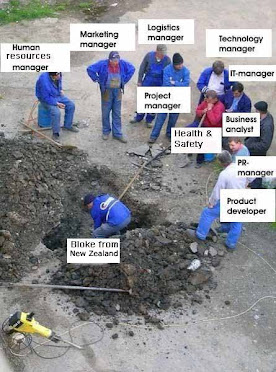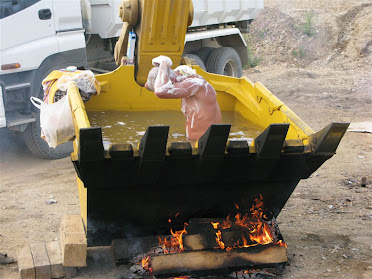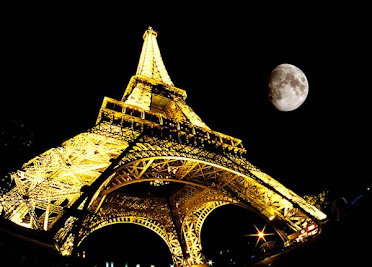Na světě lidí přibývá !
Na světě lidí přibývá, v množství větším než malém !
Jakých a kde ?
Co nám o tom napsaly noviny "The Australian"
=======================================================
Fundamental religious groups have more children!
Interesting?
Here is an article about the rate of population growth among fundamental religious groups.
Religious baby boom primed to send shock waves through secular world!
From: The Australian
October 02, 2010 12:00AM
Canadian author Eric Kaufmann sees demography as a time bomb for democracy
WE know about the ageing of developed countries and the number of people on the move, but the figures can still startle.
In 1900, the West, including Russia and eastern Europe, accounted for 35 per cent of the world's population; today it accounts for 17 per cent, and that number is expected to fall to about 10 per cent by 2050.
In 1959, Europe had 2.5 times the population of Africa. By 2050, according to UN estimates, Africa will have more than four times Europe's population and almost 40 per cent of Europeans will be over 60.
Between 2000 and 2005, 17 million people moved from developing to developed countries.
According to Eric Kaufmann, reader in politics at Birkbeck College, London, and author of Shall the Religious Inherit the Earth? Demography and Politics in the Twenty-First Century, the kicker is that these changes don't just indicate rational adjustment to economic opportunity, humans as work units being shuffled around by the invisible hand of capitalism. They presage a deep cultural shift: a coming eclipse of the secular, the scientific and the religiously moderate by the militantly devout.
His thesis cuts across anxiety-inducing clash of civilisations theory argued by conservatives. Indeed, he tabulates the high birthrates of Christian fundamentalists, such as the Amish and the Mormons, in the US and Orthodox Jews, the Haredim, in Israel. And while Muslim migration to Europe has grabbed headlines, Kaufmann shows that rising numbers of religious through migration there include Christians. In London, 60 per cent of churchgoers are non-white.
He also points out historical ironies, beyond the notion of colonial chickens coming home to roost. The US was built by Protestants, for example, largely in flight from Catholic hegemony, and Protestants made up almost 98 per cent of whites in the early days of European settlement; by 2050, thanks to Hispanic migration, Catholics will be in the majority.
What's more, despite being famous for its religiosity, the US is experiencing a falling away of belief among young whites, a fall that could eventually bring them into line with white Europeans. Meanwhile in The Netherlands, famous for its broadmindedness, the orthodox Calvinist population is the youngest and fastest growing.
Despite Kaufmann's impeccable liberal credentials, it's blindingly clear from his argument that the faultline of the future will be between Muslims, who are becoming more numerous and more religious, and the rest, who are dying off.
Muslim migration to the West is filling demographic needs but also brings a new (or, rather, ancient) set of morals and mores.
Projections based on present fertility rates and migration suggest that Switzerland could be 25 per cent Muslim by 2100, including nearly 40 per cent of under-14s. Austria could be 36 per cent Muslim. Trends do suggest, though, that fertility rates among Muslims eventually drop to those of the host country, so those figures may be alarmist.
And if settler countries such as Australia and the US expected and got high levels of assimilation, something -- perhaps the legacy of colonialism combined with high tolerance of others demanded after the horrors of the World War II -- has made the mix in Europe problematic.
"In the 19th century you have the drawing of lines in the sand by fundamentalists and that process continues to our time, a time of demographic revolution and which gives it a much stronger charge," Kaufmann says by telephone from London, on the eve of visiting Sydney next week. .
Critics have jumped on his argument. A review by Tim Black on Spiked was sarcastically titled, "The barbarians are copulating at the gate". Kenan Malik, in the London Observer, compared Kaufmann to the conservative Mark Steyn whose "Eurabia" argument in his bestseller Standing Alone: The End of the World as We Know It, suggested Europe was finished.
Douglas Murray, of the Centre of Social Cohesion in Britain, by contrast, wrote in The Literary Review that Kaufmann's book was not only "authoritative and fascinating but free of an agenda. He is not arguing a case so much as peeling back and exposing a layer of frequently unmentioned issues."
Which is true. Kaufmann, a Canadian, is like many Westerners who, on the one hand, value their own culture and want to live in it and, on the other hand, want to respect other cultures as equal and equally valid.
He starts by sketching the concerns of patriots, from ancient Greece to our day, who predicted the end of civilisation because of falling birthrates, decadent lifestyles and the vigour of barbarians knocking at their gates.
Kaufmann doesn't endorse Francis Fukuyama's thesis that liberal capitalism is the end point of human progress and that military technology will insulate it from that cyclical fate of empires past. But he does suggest that the idea that our society is forever does permeate our thinking, which we should reconsider.
"I'm talking about several generations down the line, but I think there's going to be more of a challenge to those freedoms from religion," he says. "And I think that there will be a temptation to accommodate in order to preserve social peace."
He points to the way Middle Eastern regimes, which stomped on Islamism within their borders, have become more puritanical, implementing sharia law and forcing women to cover up to offset the appeal of fundamentalism.
Though he ecumenically uses Christians and Jews as examples of how change may play out relatively comfortably in the US and Israel, it is in Europe and with the Muslims that these problems have already reached the national level: France and the burka; freedom of expression in The Netherlands and Denmark; the Archbishop of Canterbury suggesting an entente with sharia law.
And Muslims make up only 0.6 per cent of the US population, increasing peer pressure to conform, and have above-average education and incomes. They are, in other words, American success stories, which undercuts the value of religion as an identity prop.
Kaufmann is sympathetic to religion. "Perhaps because I have always been underwhelmed by Carl Sagan's 'billions and billions', I can't see how scientific wonder gets us any closer to filling the God gap," he writes.
He also takes a utilitarian view that if religion maximises happiness for a majority of people, then it is a good thing. He is talking of religion as a personal belief system, however: whether it maximises happiness for other people, especially those confronting evangelism or the repercussion of apostasy, and in places where religion holds back education, medicine and other material advances, is something else. He also quotes Richard Dawkins's quip that religion's contribution to wellbeing doesn't make its tenets correct.
How to get people "excited about secularism" is a sub-theme of the book, he says.
It's a tall ask. Secularism is precisely about the absence of a seductively totalising world view, and that's where its weakness lies. Kaufmann quotes philosopher John Rawls -- "Justice does not require that men stand idly by while others destroy the basis of their existence" -- but adds that Rawls urged liberals to tolerate the intolerant, nonetheless, unless they posed a threat to the institutions of liberty.
"There is a big literature out there that's critical of secularism as a colonialist paradigm that is not appropriate to a multicultural society," Kaufmann says.
His demographic framework allows him to sidestep the issue of what religion may triumph where, and in conversation he sounds more sanguine than he does in writing.
"I don't think anything is inevitable," he says, and refers to the potential of Iran where, in a mirror of Europe, the demographic tilt has created a majority of young people, many of whom are restive under theocratic rule.
"The combination of multicultural toleration with the demographic conundrum we're in doesn't necessarily bode that well. But I would say we have a lot of time."
Eric Kaufmann will speak at The Festival of Dangerous Ideas, Sydney Opera House, this weekend.
Dr Michael Bounds
Director | Cambridge Examinations | Australia
T +612 9555 9752 | F +612 9555 9760
PO Box 186 Balmain Sydney NSW 2041
mbounds@cambridgeexams.com.au
www.cambridgeexams.com.au
Keep kissing their ass?
This is a shocking 4 minute clip from CBN News in Paris. They'll never show this on mainstream media in the US - until the PC Police stops blocking such information.
We’re not far from it. They’re doing similar things in New York every day.
Click this link:
expandion
Keep kissing their ass!

















































































































No comments:
Post a Comment